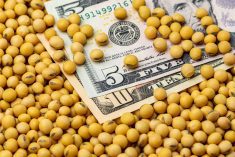Winnipeg | Reuters –– Ontario’s move to protect bees by reducing use of a pesticide seed treatment may diminish corn and soybean production, seed companies said on Wednesday.
Beekeepers welcomed the move by Ontario, the first North American government to curb use of seed treated with neonicotinoids, which are used to kill insects that harm crops.
Ontario, Canada’s biggest producer of corn and soybeans, said Tuesday that it aims to reduce by 80 per cent the acres planted with neonicotinoid-treated corn and soybean seed by 2017. Fruits and vegetables need pollinators like bees to grow and a federal agency has linked bee deaths to neonicotinoids.
Read Also

U.S. grains: Soybeans continue gains on Trump’s China comments
Chicago | Reuters – Chicago Board of Trade soybeans continued a three-day rally on Friday, fuelled by President Donald Trump’s…
If approved, new rules will go into place by July 1, 2015. [Related story]
The change would affect about 95 per cent of corn and 60 per cent of soybeans planted in Ontario, said Dave Baute, president of the Canadian Seed Trade Association, whose members include Syngenta, Monsanto and DuPont Pioneer. The companies treat seed with pesticide and sell it to farmers.
“It’s hard to get our head around just how serious the implications are for our industry,” Baute said Wednesday.
Restricting neonicotinoids could force farmers into practices that may hurt the environment, such as tilling soil more often to control insects, Baute said.
Rapeseed crops in Germany are suffering high insect damage after the European Union’s ban on neonicotinoids, a farm association said.
Ontario’s reduction is impractical to implement and could lower yields if insect attacks don’t allow crops to properly grow and establish themselves, Baute said.
“We see a significant threat to agricultural producers when regulations not based on science are being implemented,” Ray Duc, chairman of the Ontario Fruit and Vegetable Growers Association, said Wednesday in a release.
“Had to be done”
Tibor Szabo, who produces about 1,000 hives per year near Guelph, said he lost 60 per cent of his bees over winter, compared to his usual mortality rate of two to 10 per cent.
Ontario’s decision “had to be done or the business of beekeeping would no longer be sustainable or part of the future in Ontario,” he said. “This is the worst year I have ever seen it.”
The seed association said companies and farmers have already greatly reduced bee deaths since 2012 by better controlling dust during planting, citing a 70 per cent drop in reported bee deaths in 2014 from 2013.
“This new government regulation restricting seed treatment usage ignores the improvements already made and has grave economic consequences for agriculture in Ontario,” Craig Reid, chairman of Farm Action Now, a coalition of Ontario farm groups, said in a release.
Those numbers don’t take into account that a large percentage of Ontario bee colonies had already died, and a cold spring left bees less active this year, said Szabo, who’s also president of the Ontario Beekeepers’ Association.
— Rod Nickel is a Reuters correspondent based in Winnipeg. Includes files from AGCanada.com Network staff.













